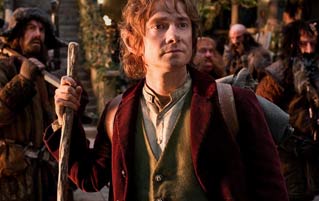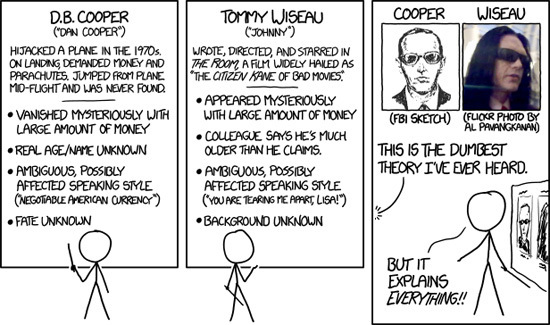6 True Stories Behind Crappy Movies (That Explain A Lot)

Have you wondered how movies get made? We don't mean like the craft of cinematography or what it means to be a best boy. We mean how a group of grown-ass men and women can hear the pitch for I, Frankenstein and say, "Here's $65,000,000!" Usually it has to do with a misread marketing report, a series of catastrophic failures, or a sheepdog switching bodies with a producer due to a fortune-teller's curse. But sometimes the answer is even stupider:
Peter Jackson Rushed The Hobbit Trilogy Because Another Director Dropped Out
Comparing the original The Lord of the Rings trilogy to The Hobbit movies is like comparing the first time you made love to the first time you fell genitals-first onto a hand railing. But how is that even possible? Peter Jackson was behind both trilogies, and if he was wiser, wealthier, and had better technology, why did it turn out so bad the second time? Four words: Guillermo del fucking Toro.

Who rapidly lost interest when the studio vetoed Bilbo piloting a giant fighting robot.
You see, del Toro was originally set to direct the prequels, but he almost immediately ditched the production. The perfect backup plan, Peter Jackson, was called in to replace him at the last minute. Unfortunately, Jackson didn't like del Toro's design choices and rebuilt everything from the ground up. There was absolutely no time for this; he had taken several years at the height of his enthusiasm and virility to plan out The Lord of the Rings trilogy but would have only a few months for The Hobbit films.
The result was that Jackson had to wing it throughout the entire production, putting actors in front of green screens and just sort of going from here. Things like "storyboards" and "scripts" were rare luxuries and he even had to turn two movies into three because he couldn't figure out how to shoot the final battle. If you think of The Lord of the Rings as a master chef preparing a fine meal, The Hobbit was a janitor at a hot dog factory found dead in a meat vat.

"Well... We already paid for the ingredients..."
In the Blu-ray release of this doomed trilogy, all of the behind-the-scenes featurettes sound like extended apologies. They talk about how tired Jackson was, or how pulling two movies out of his ass destroyed him. There are literally shots of him looking sad while people talk about how sad everything was. And, again, this wasn't some tear-down piece on a mean-spirited blog -- they included it in the bonus features of their own movie! These filmmakers did everything short of putting a Surgeon General's warning on the film that watching it could be hazardous to your happiness.
"Thanks for buying our movie! Stay tuned after the feature to hear us explain why it was terrible!"
But if you liked The Hobbit films, that's okay too.
Nobody Knows How Tommy Wiseau Paid For The Room -- But There Are Some Weird Theories
The Room is the cult classic that is widely considered to be the best bad movie ever made. It's mind-bogglingly awful, yet painstakingly produced -- it was not a lazy project by a disinterested hack. It was a full-fledged $6 million production by a desperate, unrelatable maniac.

No, not Kubrick.
Because of this, the entirety of the $6 million was funded by writer/director/star Tommy Wiseau. How did an obviously insane Eastern European man come up with that kind of money? Nobody has a goddamn clue. He had no wealthy relatives or successful business ventures that anyone knew about. He simply showed up one day with a bag of crazy money and a bigger bag of crazier ideas. He's stated in interviews he got the money from Korean yo-yo and pleather jacket distribution, but that's more a pile of strange words than a business plan, and he's been so misleading and cagey about his past that nothing he says can be trusted.
The mystery surrounding the money has sparked a number of conspiracy theories, and they are batshit insane, but not as insane as this man having a perfectly ordinary backstory. Castmates have alleged in interviews that Tommy had mob connections in San Francisco, and he amassed his fortune doing favors for them. Others have taken things a step further, alleging that Tommy Wiseau is actually D. B. Cooper, the famous plane hijacker who stole $200,000 then jumped out into the stormy nether below. Was he never seen again, or did his head hit 25 different trees and turn him into Tommy Wiseau? We'll let xkcd spell it out for you:

If you still aren't convinced because $200,000 doesn't equal $6 million and the whole thing is absurd, ask yourself this: why would you be so adamant about it unless you yourself were in on the conspiracy? Checkmate, reader.
But whatever the truth may be (the Korean yo-yos, probably?), fans continue to unravel the perfect storm of madness that is The Room. Decades from now, academics will still be studying this film to learn the exact set of circumstances that allowed such uncompromised filmmaking to turn into such a spectacular mess of deranged plot, dialogue, and football tossing.
The Last Witch Hunter Was Based On Vin Diesel's D&D Character
A fun fact traded by nerds everywhere is that action star Vin Diesel loves Dungeons & Dragons. In fact, he's so vocal about his D&D enthusiasm, Wizards of the Coast let him write the foreword for their 30th anniversary release. Which means every time you need to look up how many hit dice an Otyugh has, you can also read Hollywood's Vin Diesel's childhood memories of being eaten by them.

"I'm a level 17 sex wizard."
One day, he was talking to screenwriter Cory Goodman about one of his old D&D characters -- a witch hunter named Melkor. As Vin said in an interview, he "obviously" stole the name from The Silmarillion. That's the depth of this man's nerdery -- he assumes knowing all the names in the 12th most popular Tolkien book is the default human setting.
Goodman was so inspired by his tales of witch hunting and frantic 20-sided-die rolls that he went off and wrote a script that was the Hollywood equivalent of Sonic fan art. Vin, possibly a bit too close to the project to be objective, loved the idea of a film based on his childhood Dungeons & Dragons character. And so The Last Witch Hunter went into production.

Nobody told him to grow that beard, he just showed up on set with it.
Assuming that everyone whom Vin Diesel ever played D&D with remembers his character, The Last Witch Hunter is a movie based on a pop culture reference for about six people. However, it does include some nods to the game system itself. There are a group of witches called the Hexan that are an homage to the Drow race -- those are Dark Elves in D&D if you didn't know. And here's one very, very few fans caught: One character in the movie called himself a 14th level warlock.
Did you catch it? Because Vin himself described that reference, a person in a fantasy film saying the words 14TH LEVEL WARLOCK out loud, as a subtle "wink wink to the D&D heads." If that's Vin Diesel's idea of a wink, his idea of a pickup line is drawing a question mark on his penis and blowing two air horns at you while you pee.

A theory that his recent interview confirms.
But no matter how much you love clumsy references to things you sort of remember, no amount of in-jokes could save The Last Witch Hunter from something more terrifying than even witches: mediocrity. The movie faded into obscurity almost before the D&D heads had time to explain all the jokes to their Twitter followers. Still, poor reviews and lackluster box-office numbers weren't enough to discourage Vin, and plans for a sequel are already underway. He must have failed his saving throw vs. dumb idea, which is a very clever penised airhorn blow at all of the D&D fans out there.
Kevin Smith's Tusk Was Based On A Random Story From His Podcast
Whether you love him, hate him, or love to hate him, there's no denying Kevin Smith had his finger on the pulse of nerd culture for a decent amount of time. He's also unusual as a filmmaker in that he seems to talk about his work far more than he works on his work. A lot of this happens on his podcast which he calls The SModcast because he's counting on his fans to be very, very forgiving.

Not that forgiving.
On one of The SModcast's episodes, he retells a story he saw online about a man offering free room and board to anyone. The catch was, the tenant had to sometimes dress like a walrus. It seemed like the ramblings of a man looking to put the spark back into murder, but apparently he was chasing a memory of the time he was stranded on an island and befriended by a walrus. A stranger in a walrus costume wouldn't be as good as the real thing, but murderer boners often forgive such imperfections.
Smith rightfully looked at this story and said, "This is a freakin' horror movie right here." He spent the next hour of his podcast hashing out how this movie would go down, paving the way for what would eventually become the polarizing horror-comedy, Tusk. In it, Smith decides to go full Human Centipede and make the lonely old man an amateur surgeon who amputates his tenant's limbs and forcibly puts them into a walrus costume. And as macabre as that is, it's still more believable than that man and that walrus being "just friends."

Don't ask what he did with the tusks.
Despite the film's abysmal performance at the box office and a resounding "meh" from the critics, Smith decided that he loved the movie enough to make a whole trilogy of Canada-themed horror comedies. Whether this trio of films will make it into the pantheon of Kevin Smith cult classics or fall to the wayside like his 10 movies that weren't Clerks or Mallrats is yet to be seen. For now, let's just appreciate the fact that Kevin Smith wants to make Jaws with a moose and call it Moose Jaws. That's the act of a man who wouldn't give you a fuck if he came upon you dying fuckless in a desert.
Two Producers Made The Exact Same Movie To Spite Each Other
There's this weird phenomenon where two movies come out about the same thing at the same time. Like Armageddon and Deep Impact. Or Dante's Peak and Volcano. More often than not, this is purely coinci- oh yeah! Olympus Has Fallen and White House Down! What we were sa- The Equalizer and John Wick! Back to our point, these "Twin Films" are usually random occ- oh! Oh! Paul Blart: Mall Cop and that documentary about Seth Rogen doing bath salts in a shopping mall! The point is, nobody meant for that to happen.


No DreamWorks guy is starting meetings saying, "Do what Pixar is doing, but worse!"
Until a certain sexy, forbidden dance came along.
The story involves two Israeli cousins and a dance craze that they were hoping would sweep the nation -- the Lambada. Menahem Golan and Yoram Globus moved to Hollywood in the 1980s to pursue their dream of making movies. They became the Roger Corman of their generation, churning out one schlock of a movie after another, most of them about ninjas. Sadly, the Israeli dynamic duo broke up in 1989 when their production company, Cannon Films, faced bankruptcy. Golan dumped everything on his cousin and left to start 21st Century Film Corporation. This left Globus a bit miffed.

And 20th Century Fox trademark lawyers saying, "Dude, seriously?"
It was around this time that the Lambada -- a Brazilian dance developed to inseminate denim -- was making headlines. Not because lambada night clubs were popular, but because news producers always say yes if you pitch them a story about simulated sex. Hoping to cash in on this "phenomenon," Globus announced Lambada, a film based on the hit dry hump, lambada. This wasn't the first time he did something like this. Cannon Films made many movies in the "fads sweeping the nation" genre like breakdancing (Breakin') or rapping (Rappin'). And this lambada thing looked like it might even be bigger than the last nation-sweeping fad they based a film on, arm wrestling (Over the Top).
Golan, also recognizing the opportunity, rushed his own lambada-based film into production, starting a massive feud between the two movies. Globus secured the rights to the word, "lambada," forcing Golan to call his movie, The Forbidden Dance. Golan countered by getting the rights to the song, "Lambada," meaning the lambada movie wouldn't feature the titular song. All the while, both movies kept pushing their release dates up in a race to be released first. Because in the world of lambada, if you're not first, you're just some poor woman rubbing up against sticky, wet pants.

To put this in perspective, replace every instance of "lambada" with "Macarena" or "Achy Breaky Heart."
The schedules were so accelerated they had just under two weeks after shooting to get the final product out. Both movies were resounding failures. However, we learned two things from the ridiculous, stupid feud: We learned Globus' movies about dry humping lose a little bit less money than Golan's, and we learned the public was interested in approximately zero of them.
Tax Loopholes Created Uwe Boll's Career
Have you ever seen The Producers? It's a musical-turned-movie about two guys trying to exploit accounting loopholes to make a profit from a flop. Most of you would think of this as a silly concept, but a cranky, inept man named Uwe Boll stole it to start a film career.
With a side gig of running away from Seanbaby.
If you haven't heard of him already, Boll is the guy who got famous a few years ago for making a series of hilariously shitty video game movies: BloodRayne, House of the Dead, Postal, Alone in the Dark, Far Cry, etc. If you know anyone who thinks all video game movies are predestined to be shit, no one on Earth bears more responsibility for that than Uwe Boll.
It'd be one thing if he were simply a bad filmmaker who loved video games, but Boll's actually just using movies as a way to exploit tax loopholes. Here, we'll try to explain:

When a man loves money and hates art very, very much ...
A few years back, Germany tried to revitalize its country's cinema, so it created a bunch of tax breaks for German movies and studios. One of them was that they only taxed filmmakers on a movie's profits -- all of the money spent making it could be deducted. It was likely meant to be a safety net to encourage experimentation and bold investments, but in Uwe's hands, it became a way to hide money from the taxman.
Imagine a can of chili that came with a free can of chili if you used the first one to clog a German toilet. Now stop imagining that, because it's not exactly how this works. Imagine instead you put $10 million into an Uwe Boll movie. It's terrible, no one enjoys it, but you do get $8 million back because there's still some money to be made even from a turd (TV rights, foreign markets, stuff like that).

They're very popular with Guantanamo Bay interrogators.
You're now down $2 million. Your millionaire friends all laugh at you for your dumb investment while they each put their $10 million in the bank. Then taxes are due and they each lose $4 million. Do you see what happened? You have $2 million more dollars than them and your name is in the credits of In the Name of the King: A Dungeon Siege Tale alongside Jason Statham! It's obviously a bit more complicated than this explanation suggests (it requires a bunch of paperwork shenanigans in between steps), but the takeaway is this: when you have $2 million spare dollars and Jason Statham's phone number, you will get laid.
The great thing about this plan is that if it goes "wrong," your movie is a huge hit and you make a lot of money! Luckily, that is not a problem Uwe's investors have ever had to worry about.
Think Nana and Pop-Pop's loving 60-year monogamous relationship is quaint and old-fashioned? First off, sorry for that disturbing image, but we've got some news for you: the monogamous sexual relationship is actually brand new relative to how long humans have been around. Secondly, it's about to get worse from here: monkey sex.
On this month's live podcast, Jack O'Brien and the Cracked staff welcome Dr. Christopher Ryan, podcaster and author of 'Sex at Dawn', onto the show for a lively Valentine's Day discussion about love, sex, why our genitals are where they are, and why we're more like chimps and bonobos than you think.
Get your tickets here:
For more insight into awful ass movies, check out 6 Famously Terrible Movies That Were Almost Awesome and 5 More Famously Terrible Movies That Were Almost Great.
Subscribe to our YouTube channel, and check out 8 True Story Movies That Are Full Of Lies, and other videos you won't see on the site!
Follow us on Facebook, and we'll follow you everywhere.